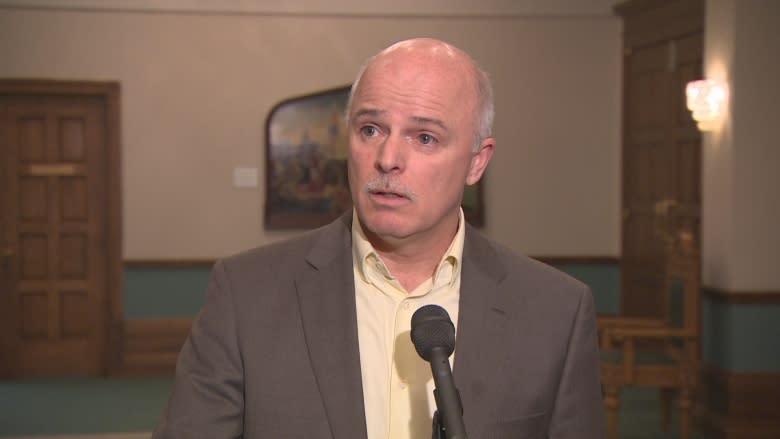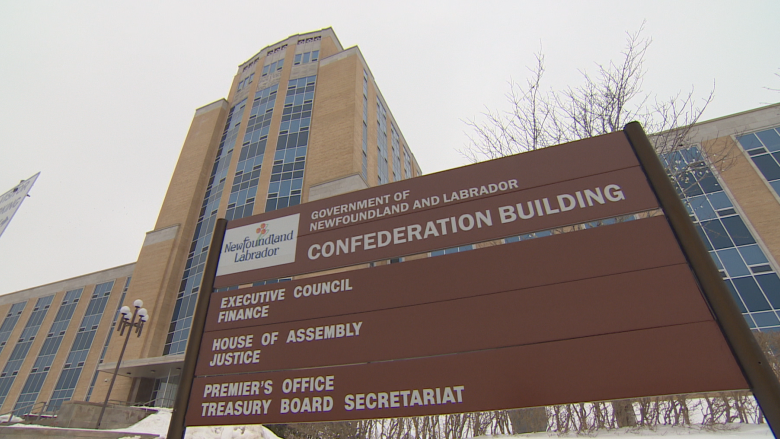War of words ramps up over tentative NAPE contract as finance minister weighs in
It's not even signed yet, but a tentative collective agreement for Newfoundland and Labrador's largest public sector union has sparked a war of words — with the provincial finance minister and NAPE president on one side and the St. John's Board of Trade on the other.
"The Board of Trade have been absolutely irresponsible here. They are fear-mongering, it is dividing the community," said Finance Minister Tom Osborne late Friday afternoon, in what was the latest development in the conflict.
He was firing back after comments from Board of Trade chairperson Dorothy Keating a few hours earlier.
Keating said the no-layoff clause in the proposed deal to NAPE members would severely restrict the government's ability to modernize and improve services and address its dire financial situation.
"The no-layoff clause will be on the negotiating table at the next round of collective bargaining. This will give the union significant leverage as government will have to engage in concessionary bargaining in the next round of negotiations," Keating said.
She said the province borrows $2 million daily "to keep the lights on," and has the largest and most expensive public sector in the country.
The board has been lobbying government to carry out a program review to "bring us into the 21st century" in terms of service delivery.
"This is about modernizing service delivery so you will not have to wait in line to register your children for kindergarten or wait for your test results to be faxed or mailed to your family physician," she said.
But Osborne insisted the Board of Trade is fixated on a particular point without any basis.
"We have absolute certainty that this layoff clause does not roll over into the next agreement. I've given that assurance to the Board of Trade weeks ago, they continue to fear monger," Osborne said.
"We have an excellent deal for both the people of the province and for our public servants."
NAPE president also on the offensive
NAPE president Jerry Earle also took aim at what he described as fear mongering by the St. John's Board of Trade on Friday morning.
"Despite what the employers' groups say, public services are more than a cost on a ledger sheet," Earle told reporters.
"This was the absolute best deal given the current economic situation of our province."
The board answered a few hours later by again suggesting a no-layoff clause in the agreement could possibly push the province over a financial cliff.
Earle confirmed Friday that there is no sunset clause on the no-layoff provision.
"Every item in the collective agreement is on the table next time around," he said, calling the no-layoff clause one element of an agreement that strikes a balance between protecting workers and the province's bottom line.
"All this clause means is that the government cannot simply slash and burn the frontline workers of this province which has been the case far too many times in the past," Earle said.
Government can still cut jobs if there's a proven lack of work, and through attrition but, "They can't come in and target workers for economical reasons," he explained.
Earle breaking with tradition
Earle broke with tradition Friday when he opened up about the union's tentative deal with the provincial government, saying he had to respond to criticisms from groups like the BOT and the Newfoundland and Labrador Employers' Council.
Some details of the agreement have been leaked through the media.
Besides the no-layoff clause, union members who qualify will also receive lump-sum payments in order to do away with severance benefits.
This one-time expenditure will cost government roughly $240 million, said Earle.
But it's the no-layoff clause that's drawing the most fire from people like Keating.
"We have to do something as a province to maintain the ability to manage our own financial affairs," said Keating.
The board of trade has also charged that such a clause sends a signal to lending agencies that the province is not serious about addressing its crippling annual deficits.
'This will boost the local economy'
Earle said the union fought against layoffs, while agreeing to a wage freeze for the duration of the four-year agreement.
"To think we would strike a deal that would jeopardize the future of our province is patently false, is unnecessarily inflammatory, and fear mongering at its very worst," he said.
As for severance, each employee is entitled to a week's salary for every year of employment, up to a maximum of 20 years.
So an employee earning $800 weekly with the maximum number of years can receive up to $16,000.
Earle defended this expenditure, saying it will "boost the local economy."
He said voting on the deal is well underway, and should conclude by the end of January. Reaction from NAPE members has been generally positive, Earle said.





